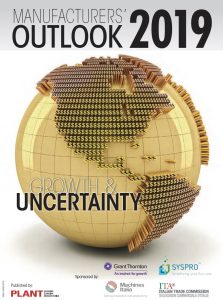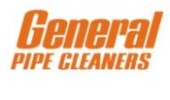
Concern heightened among Canadian manufacturers over U.S. protectionism
January 30, 2019 | By Joe Terrett
 Outlook 2019 study shows they are expecting business to be good, but confidence has tumbled since last year.
Outlook 2019 study shows they are expecting business to be good, but confidence has tumbled since last year.
By Joe Terrett, PLANT Magazine
Canadian manufacturers are optimistic about their prospects in 2019, but significantly less confident than last year as concern mounts that Trump administration policies, including U.S. protectionism, and other disruptive factors will affect their businesses, according to a new survey of senior manufacturing executives.
PLANT Magazine’s Manufacturers’ Outlook 2019 study shows 39% of senior company executives are very optimistic about the coming year, compared to 44% last year.
They are either very or somewhat concerned about what is going on in America. U.S. protectionism is very worrying to 65% of executives compared to 54% last year, followed by US protectionism (65%), U.S. President Donald Trump’s impact on nation-to-nation relationships (61%) and changes resulting from the NAFTA renegotiation (56%).
“Canadian manufacturing has been booming, but there are storm clouds on the horizon and that’s eroding Canadian CEOs confidence in 2019,” said Jeff Brownlee, publisher of PLANT Magazine, which commissioned the survey.
How are companies staying ahead of the risks? Two-thirds (66%) are conducting assessments, 29% regularly and 37% sometimes. Regulatory change leads the list of concerns for 41%.
The survey, in partnership with Grant Thornton LLP, SYSPRO Canada and Machines Italia with the Italian Trade Commission, is based on 501 replies from senior manufacturing executives.
Despite their concerns, manufacturers are demonstrating their confidence with plans to make significant investments in their businesses. Their mood going into 2019 was generally upbeat.
Controlling costs tops the list of challenges for 65% of respondents, followed by pressures on prices (61%) and filling skills needs/management talent (46%).
Companies lag in the adoption of advanced measures and technologies that would improve productivity. Only 33% make use of automatic data access, analysis and review to measure and monitor productivity; 43% do it manually; and 8% don’t measure.
Respondents demonstrated a very limited engagement with IIoT (industrial internet of things), which connects and optimizes machines via the internet. Only 7% are applying IIoT capabilities, 32% are not familiar with these capabilities and 31% said they were not applicable.
This year’s survey added questions about corporate culture–the values, beliefs and attitudes that characterize a company and guide its practices–as part of a formal business strategy. Most companies (28%) include a formal program and/or policies, 24% have an informal program in place and 23% are working on it, while 26% aren’t doing anything.
Other highlights from the survey:
- 67% of companies report most revenue comes from Canada, the U.S. (23%), Europe (2.9%), Mexico (1.9%) and China (1.3%).
- Companies entering new markets over the next three years are favouring the U.S. (29%), Canada (26%) and Mexico (13%).
- 48% of executives cite a growing risk of cyber attacks aimed at industrial targets as a medium concern. More than half (57%) haven’t experienced an intrusion but 21% were attacked within the last year. Sixty-two per cent cite phishing as the most common breach.
- 57% of respondents are focusing products, processes (56%) and technologies (47%).
- The average innovation spend for 2019 will be 3.6% of revenue but 49% do not intend to take advantage of the SR&ED federal tax credit for investment in research.
The survey, conducted by Toronto research firm RK Insights, has a margin of error of +/- 3.6%, 19 times out of 20.
Most of the surveyed companies (66%) fall into the small business category (under 100 employees); 23% are medium-sized (under 500); and 11% are large (500 or more).
Download a copy of the Manufacturers’ Outlook 2019 report, which includes an executive roundtable.




